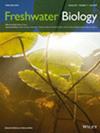Effects of Long-Term Desiccation on Zooplankton Resting Egg Banks From Tropical Lake Sediments
IF 2.8
2区 生物学
Q2 ECOLOGY
引用次数: 0
Abstract
- Dormant egg banks may be vulnerable to climate change and extreme events, such as prolonged droughts in lakes. However, there is currently no information on this issue regarding Neotropical zooplankton. This study aimed to evaluate the viability of dormant zooplankton eggs and to investigate their hatching success following an extended period of desiccation (7 years).
- Natural lake sediments with dormant egg banks were subjected to experimental desiccation for periods of 2 and 5 months, and 1, 6, and 7 years. After each desiccation period, we conducted ex situ hatching experiments to compare the structure (abundance and taxon richness) and composition of emerging zooplankton communities.
- Long-term desiccation (6 and 7 years) led to a loss of zooplankton taxa, and the effects of desiccation differed between the resting stages of microcrustaceans and rotifers. Microcrustacean hatching was unaffected up to 1 year of desiccation but was null after 6 years. In contrast, desiccation-tolerant rotifer stages (e.g., Lecane elsa and Bdelloidea) persisted through 6 or 7 years of desiccation and hatched upon rehydration. Results showed distinct species compositions among the experimental desiccation periods.
- Periods of prolonged desiccation periods reduced the taxonomic richness and abundance of zooplankton hatching from sediments, leading to subsequent changes in the structure and composition of the zooplankton assemblage wich differed among different durations of experimental desiccation.
- Our findings show that long-term droughts in lakes, intensified by changes in climate, may alter freshwater zooplankton communities. By demonstrating the resilience of rotifers and the vulnerability of microcrustaceans to prolonged desiccation, this study shows that different components of zooplankton communities will respond differently to future climates.
长期干燥对热带湖泊沉积物中浮游动物休眠卵库的影响
休眠的卵子库可能容易受到气候变化和极端事件的影响,比如湖泊的长期干旱。然而,目前还没有关于新热带浮游动物的信息。本研究旨在评估休眠浮游动物卵的生存能力,并调查它们在长时间干燥(7年)后的孵化成功率。对具有休眠卵库的天然湖泊沉积物进行为期2、5个月、1、6、7年的干燥试验。在每个干燥期后,我们进行了迁地孵化实验,比较了新兴浮游动物群落的结构(丰度和分类丰富度)和组成。长期干燥(6年和7年)导致浮游动物类群的消失,并且干燥对微甲壳类动物和轮虫休息阶段的影响不同。微甲壳类动物的孵化在干燥1年内不受影响,但6年后为零。相比之下,耐干燥轮虫阶段(如Lecane elsa和Bdelloidea)持续6或7年的干燥,并在再水化后孵化。结果表明,不同干燥期的植物种类组成不同。延长的干燥时间降低了沉积物中浮游动物孵化的分类丰富度和丰度,导致浮游动物组合的结构和组成发生变化,并且在不同的实验干燥时间之间存在差异。我们的研究结果表明,由于气候变化而加剧的湖泊长期干旱可能会改变淡水浮游动物群落。通过证明轮虫的恢复能力和微甲壳类动物对长时间干燥的脆弱性,本研究表明浮游动物群落的不同组成部分将对未来气候做出不同的反应。
本文章由计算机程序翻译,如有差异,请以英文原文为准。
求助全文
约1分钟内获得全文
求助全文
来源期刊

Freshwater Biology
生物-海洋与淡水生物学
CiteScore
5.90
自引率
3.70%
发文量
162
审稿时长
2 months
期刊介绍:
Freshwater Biology publishes papers on all aspects of the ecology of inland waters, including rivers and lakes, ground waters, flood plains and other freshwater wetlands. We include studies of micro-organisms, algae, macrophytes, invertebrates, fish and other vertebrates, as well as those concerning whole systems and related physical and chemical aspects of the environment, provided that they have clear biological relevance.
Studies may focus at any level in the ecological hierarchy from physiological ecology and animal behaviour, through population dynamics and evolutionary genetics, to community interactions, biogeography and ecosystem functioning. They may also be at any scale: from microhabitat to landscape, and continental to global. Preference is given to research, whether meta-analytical, experimental, theoretical or descriptive, highlighting causal (ecological) mechanisms from which clearly stated hypotheses are derived. Manuscripts with an experimental or conceptual flavour are particularly welcome, as are those or which integrate laboratory and field work, and studies from less well researched areas of the world. Priority is given to submissions that are likely to interest a wide range of readers.
We encourage submission of papers well grounded in ecological theory that deal with issues related to the conservation and management of inland waters. Papers interpreting fundamental research in a way that makes clear its applied, strategic or socio-economic relevance are also welcome.
Review articles (FRESHWATER BIOLOGY REVIEWS) and discussion papers (OPINION) are also invited: these enable authors to publish high-quality material outside the constraints of standard research papers.
 求助内容:
求助内容: 应助结果提醒方式:
应助结果提醒方式:


